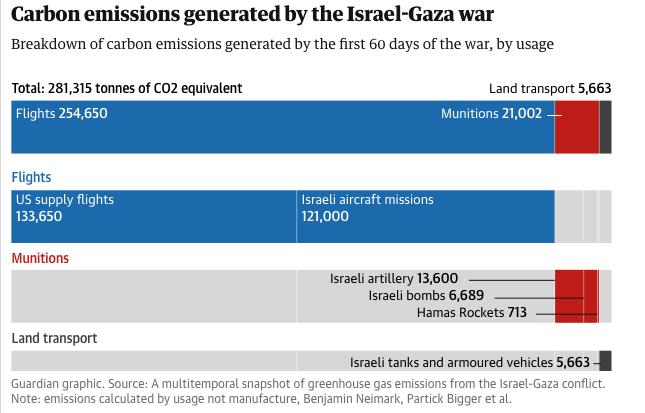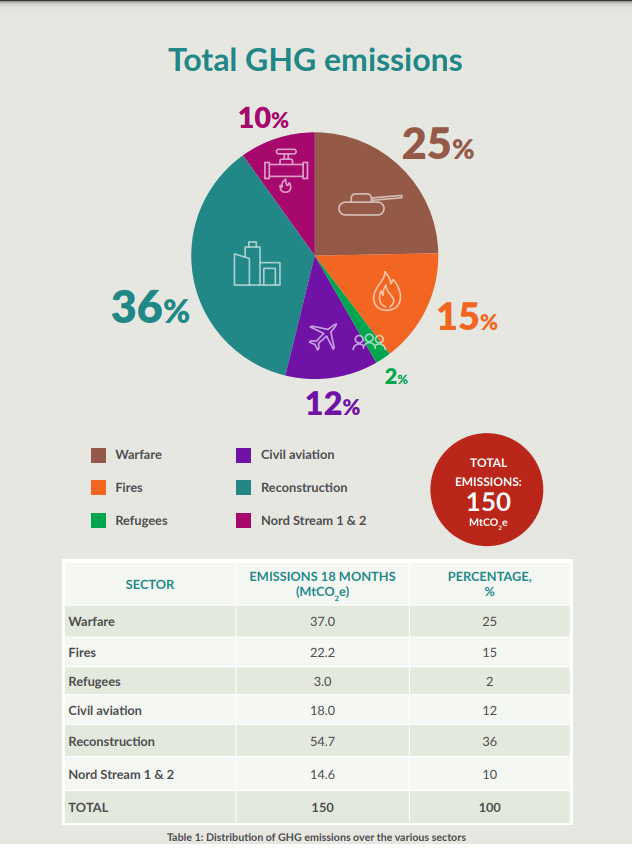Although direct emissions from war, termed “Scope 3+” by the Conflict and Environment Observatory, are important, more critical are the resulting global increase in military spending and the increased Scope 3 emissions by the war industry. (See The Ukraine Crisis and the Recent IPCC Report.) Amitav Ghosh highlighted this problem in his post Ukraine invasion essay in Greta Thunberg’s The Climate Book, “…affluent nations felt able to contribute only $10 billion to a fund to help countries which are exceptionally vulnerable but had no difficulty in increasing their defence spending by $1 trillion.”
War/Genocide in Gaza
A study by researchers at Queen Mary University of London reported in June 2024: “The emissions from the first 120 days of the Israel-Gaza conflict exceeded the annual emissions of 26 individual countries. This period saw intense military activity, including bombing raids, reconnaissance flights, and rocket attacks.” As of Spring 2025, Israel’s military assault, now formally labeled a genocide by the International Court of Justice, the UN Commission of Inquiry, and human rights experts, has accelerated, with the bomb tonnage dropped on Gaza exceeding 70,000 tons from US-made F-15s, F-16s, and F-35s which burn thousands of gallons of fuel per hour. This bombardment of the civilian population surpasses the combined bomb tonnage dropped on Dresden, Hamburg, and London during World War II.
The removal of debris, unexploded bombs and missiles, and toxins, added to the massive rebuilding, will generate millions of metric tons of CO2 and other greenhouse gasses.
According to a report in the Guardian, 60 days of war in Gaza is estimated to have generated 281,315 metric tons of CO2 equivalent.
War-Generated Air Pollution in the Middle East
An analysis conducted in Spring 2025 by former U.S. Congressman Dennis Kucinich concluded “Israel, in executing the unprecedented bombing attack on Gaza, is, in effect, bombing itself, with grave consequences for the public health of its people. What is being visited upon Gaza does not stay in Gaza.” In addition, Kucinich states “Israel, in bombing neighboring Gaza, is breathing in its own fallout, along with the vaporized remains of its declared enemies. The external consequences of violence becomes internalized. The substance of the oppressed communes with the oppressor.”

For details see “A Multitemporal Snapshot of Greenhouse Gas Emissions from the Israel-Gaza Conflict.”
Russia-Ukraine War Climate Impacts
A scientific assessment of Green House Gas (GHG) emissions at the two-year point of the Russia-Ukraine War from June 2024 includes the warning: “… GHG emissions continue to grow.” This 4th assessment of the conflict concludes that war emissions increased to 175 million tons of CO2, which equals the climate impacts of putting 90 million new gas-powered cars on the road, or building 260 coal-fired power plants.
“World military spending reached an all-time high of $2.24 trillion in 2022, as Russia’s invasion of Ukraine fueled a sharp jump in military spending across Europe, according to a leading defence think tank.” - cited in https://bit.ly/milspendinghigh.
Estimated total GHG emissions resulting from Russia’s invasion of Ukraine between February 2022 and February 2023 (De Klerk et al., 2023)
Results of studies into specific environmental impacts on Ukraine can be accessed at this report: https://ceobs.org/countries/ukraine/ .
Beyond just the numbers, “The forced movement of people, the destruction of agricultural land and the increased instability are being felt in Ukraine and beyond, said John Kerry, former President Biden’s climate envoy” in a 2023 New York Times article.

Estimated total greenhouse gas emissions resulting from 24 months of Russia’s invasion of Ukraine (de Klerk, 2024)
Current Conflict Emissions Compared to U.S. Military’s Carbon-Bootprint
These statistics about conflict-generated carbon emissions and air pollution, and the human and environmental devastation they point to, are staggering.
Although direct emissions from war fighting, termed “Scope 3+” in a report by the Conflict and Environment Observatory, are important, more critical is the resulting global increase in military spending and the increased Scope 3, “Supply Chain,” emissions by the war industry.
Indian author Amitav Ghosh highlighted this problem in his essay in The Climate Book, edited by activist Greta Thunberg: “…affluent nations felt able to contribute only $10 billion to a fund to help countries which are exceptionally vulnerable [to the climate crisis] but had no difficulty in increasing their defence spending by $1 trillion.”

